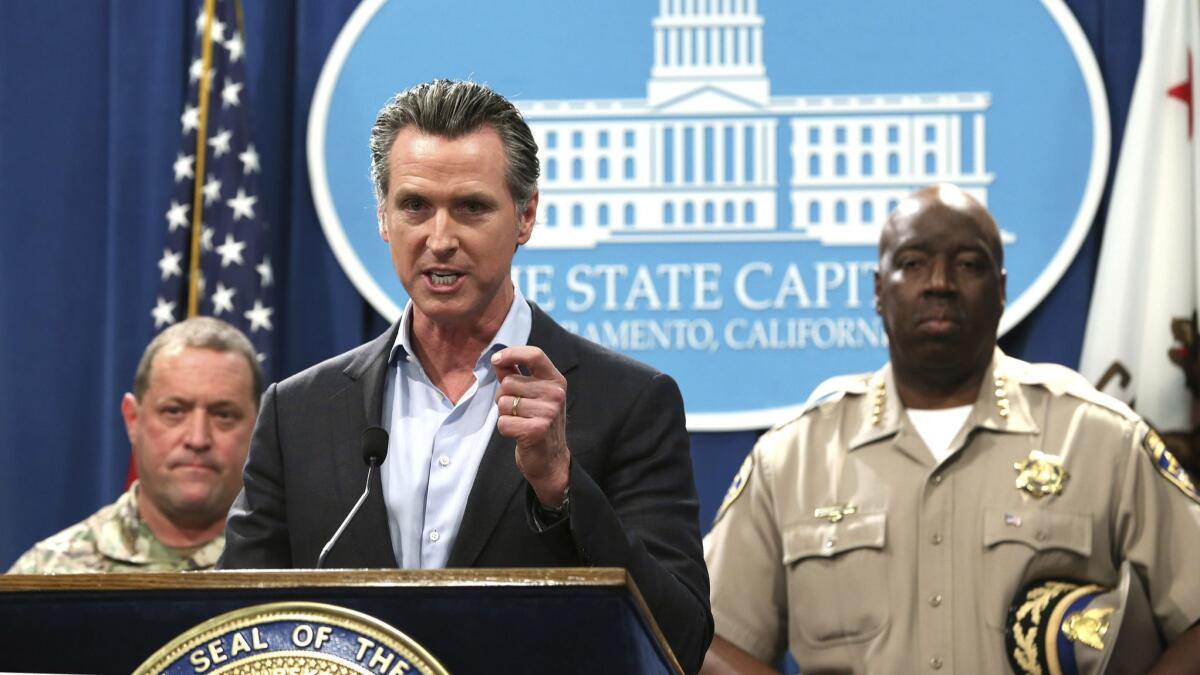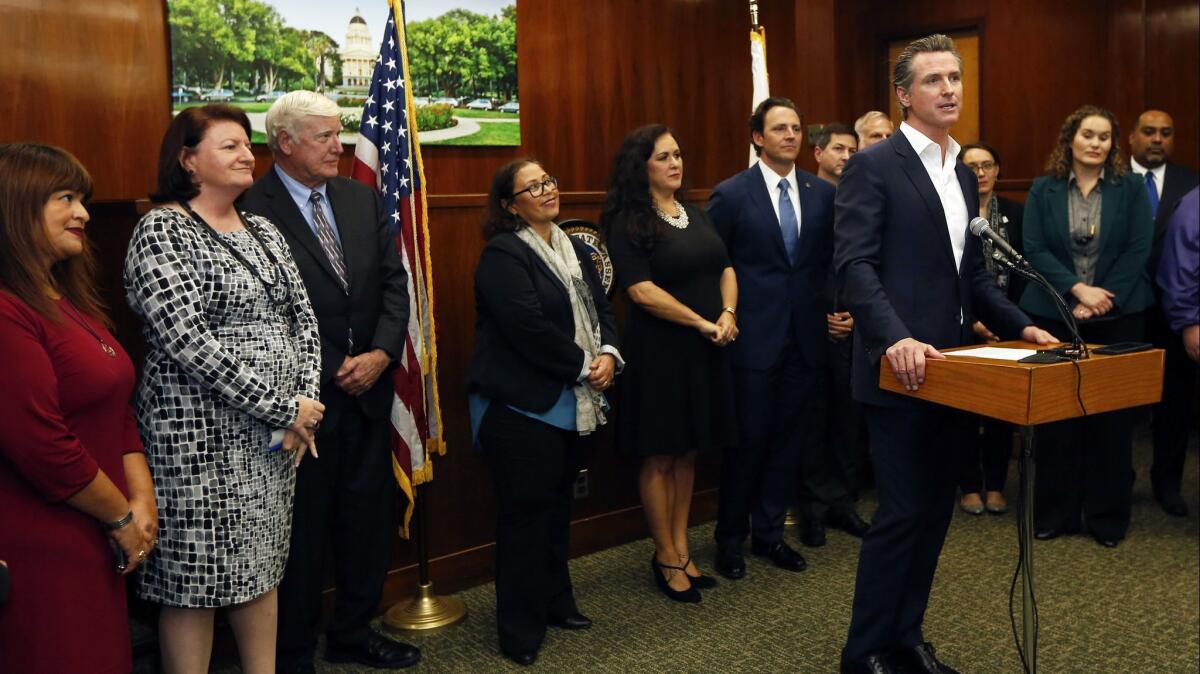As Trump and his wall push Mexico away, California aims to pull it closer

Reporting from Sacramento — As President Trump pushes Mexico further away, declaring a national emergency to force the construction of a wall along the border, Gov. Gavin Newsom and California lawmakers have made clear they want to draw the country closer.
Along with a commitment to reopen a trade office in Mexico City, the governor also plans to revitalize a state commission that would allow California officials to work on issues with their counterparts in Mexican government. And over the course of his first term, Newsom and state Democrats are expected to refocus attention on what they consider the real issues at the heart of the U.S.-Mexico relationship: tackling cross-border pollution, promoting cultural and educational exchanges, and defending the human rights of all immigrants.
In a state where Latino elected officials have helped launch a full-scale resistance to the Trump administration, top California leaders say they see a powerful ally in the state’s new chief executive. They believe Newsom’s more forceful stance on immigration and diplomatic approach to Mexico could help reinvigorate old ties and usher in an era of stronger collaboration, providing a viable alternative to the White House’s approach to relations there and around the world.
“The relationship between Mexico and California is not only a political relationship,” said Jeronimo Cortina, associate professor of political science at the University of Houston. “You have commerce, you have tourism, you have trade. Regardless of what the federal government is doing, as a governor you don’t want to lose that relationship.”
But whether the state can move beyond the symbolic wins to become an effective model for how to improve and maintain those ties depends on whether Newsom is able to deliver on his promises.
Weeks before he took office, Newsom attended the inauguration of Mexican President Andres Manuel Lopez Obrador, where he first pledged to open a trade office in Mexico City. He and his staffers have not yet released details on the plan or efforts to revive a “Commission of the Californias,” saying only that it will allow a state delegation and members of the Mexican government to work together on areas of economic, political and cultural concern.
Though most economic, foreign and border policy falls under the purview of the federal government, a governor can lead trade missions abroad, promote investment into state businesses and build alliances with government officials to elevate the state’s priorities on an international stage.
Two years ago, former Gov. Jerry Brown assumed the role of America’s unofficial ambassador on climate change, touring China to meet with business leaders and executives just after Trump announced the U.S. withdrawal from the Paris accord. In Mexico, in 2014, Brown signed memorandums of understanding to develop joint task forces and explore other ways to cooperate in battling wildfires, improving data on air quality and reducing greenhouse emissions.
State lawmakers say Newsom will be key in renegotiating those agreements, which are due to expire soon, and lauded the governor’s promise to reopen the Mexico City trade office, saying it could expand trade deals, loan agreements and technical assistance in manufacturing, alternative energy, technology and other areas.
But similar proposals for such a state-funded office were twice rejected by Brown, who pointed to existing agreements between California and Mexican officials, saying he remained “unconvinced” the state needed it. Similar foreign offices closed in 2003 amid a recession and criticism from legislators and trade experts who said they doubled services and were ineffective.
Michael Flores, the state’s secretary of foreign affairs under Gov. Gray Davis, unsuccessfully fought to keep the Mexico office open and contested the claims.
“You got to have dialogue, you have to have diplomacy, you have to be talking,” he said. “If not, there is a vacuum filled with something else — the Washington rhetoric.”
Texas was Obama’s chief antagonist. In Trump’s America, California is eager for the part »

Injecting new energy into the cross-border relationship could be a way to heal divisive rhetoric coming from the Trump administration, state lawmakers and political analysts said. But for California, it isn’t just a matter of principles, it’s economics. Newsom’s approach is “more persistence of past [state] policies than resistance to [federal] policies now,” said Tomas Jimenez, associate professor of sociology at Stanford University.
Mexico is one of the state’s top trading partners, exporting roughly $26 billion in goods and importing another $46 billion just last year, according to the state Chamber of Commerce. Latino purchasing power has grown to $320 billion since 1990, one Latino advocacy group found, and the state is home to the largest number of immigrants — most of whom are here legally — including 4.2 million people born in Mexico, more than 35% of the United States’ Mexican-born population, according to census data and the Public Policy Institute of California.
Against that backdrop, it was Assembly Speaker Anthony Rendon (D-Lakewood) and former state Senate leader Kevin de León who first began to chart the state’s course in confronting Washington, releasing a joint statement the day after the 2016 presidential election declaring California the new “keeper of the nation’s future.”
As leaders of a state that is now home to the world’s fifth-largest economy, they pledged to defend California’s progressive strides in “historic diversity, scientific advancement, economic output, and sense of global responsibility.” And as Latinos and representatives of immigrant-dense Los Angeles communities, they began reaching out to Mexican leaders and passed legislation designed to counter the president’s call for mass deportations.
In court, they found an ally in Atty. Gen. Xavier Becerra, a former congressman and the son of Mexican immigrants, and Secretary of State Alex Padilla, who challenged Trump’s unproven claims of widespread voter fraud and moves to change to the U.S. Census, which they say threaten to significantly undercount the state’s immigrant population.
While Trump has said tolerance for illegal immigration “is cruel” and the source of a “border crisis,” Newsom has dismissed those characterizations as “comedy” and the “theater of the absurd.”
He walked on stage at his inauguration just after the music group Los Cenzontles serenaded the crowd with Mexican melodies and his wife, documentary filmmaker Jennifer Siebel Newsom, read a poem in both English and Spanish by former U.S. poet laureate Juan Felipe Herrera.
The governor has since promised to expand state-funded healthcare to more young immigrants who are in the country illegally and earmarked millions for nonprofit groups assisting asylum seekers in San Diego. Last week, he ordered the withdrawal of most California National Guard members from the border, realigning the priorities of those left behind to ensure they do not enforce immigration laws.
Not all have praised the efforts. State Sen. Jeff Stone (R-Temecula) called the overall tone of last week’s State of the State address “disappointing,” saying Newsom “seemed more interested in picking a public fight with President Trump than addressing the needs of working California citizens.”
“To call the President’s actions to curtail illegal immigration ‘political theater’ is an insult to the millions of legal immigrants who came into this country legally and work hard every day to make California a better place,” Stone said in a written statement.
But others said Newsom was making a smart investment in a young and growing population of Latinos, whose numbers will boost California’s political and purchasing power and serve as an influential voter base.
California and Mexico previously experienced turbulent relations in the 1980s and 1990s, when the state was a wellspring of anti-immigrant rhetoric and measures. Television campaign ads for statewide candidates played on voters’ anxieties over race and called for increased border security, using images of immigrants streaming across the border from Mexico.
The relationship between the state and its southern neighbor didn’t begin to improve until the early 2000s under Gov. Gray Davis, who appointed Flores to serve as a liaison with Mexico.
“We’d hear, ‘No, no, Pete Wilson’ until they realized Davis wasn’t Wilson,” Flores said, calling the Davis administration’s early overtures to Mexican officials difficult.
Under Davis, Mexican Presidents Ernesto Zedillo and Vicente Fox made unprecedented visits to California, the state expanded a Mexico City trade office and Sacramento hosted a border governors conference in 2000, with members of U.S. and Mexican states. But the office closed three years later amid a recession and allegations that it took too much credit for deals other partners helped facilitate.
Over the next two decades, state legislators said, relations between California and Mexico — though haphazardly organized — remained strong as an increasingly diverse Legislature took office. Many members, some of whom began their political involvement in activism against the anti-immigrant ballot initiatives of the ’90s, took on a new focus: establishing protections for immigrants in the country illegally.
Later, as efforts to overhaul the nation’s immigration laws collapsed in Congress under the Obama administration, state lawmakers pushed Brown to work more closely with Mexican partners and sign laws to provide access to driver’s licenses, offer college tuition assistance for immigrants without legal status and put distance between immigration enforcement agencies and state and local law enforcement.
California to sue Trump administration over national emergency declaration »

After Trump’s election, Brown took a more aggressive stance to defend immigrants without legal status, signing proposals to expand previous laws on immigration enforcement and fund legal services. But he was circumspect in his speech and actions.
Some lawmakers say their Mexican counterparts have started in the Trump era to echo the same concerns once heard under Wilson.
“We spend more time than we need to with our peers across the border trying to convince them, ‘It’s not us, it’s not us,’” Senate President Pro Tem Toni Atkins (D-San Diego) said.
With a new federal administration in Mexico, some lawmakers say they believe Newsom will do more to open lines of communication.
“The governor is extremely influential in this discourse,” state Sen. Ben Hueso (D-San Diego) said. “What resources and time and attention he plans to apply to this is going to be very important. It’s going to be interesting for us to see and also send a message internationally about what this governor’s feelings are toward Mexico.”
Rendon, legislators in his chamber and others including Mexican Consul General Liliana Ferrer already have been working on the California-Mexico Strategic Dialogue initiative to develop the working relationship among officials. In April, members will take on cross-border pollution, including cleaning up sewage and waste in the Tijuana River near San Diego and the New River, which cuts through Imperial County.
“I wanted to make sure we went beyond the grip-and-grin meetings that didn’t have any impact on policy,” Rendon said. It initially had nothing to do with Trump, he said, but the state “has filled the vacuum.”
More to Read
Get the L.A. Times Politics newsletter
Deeply reported insights into legislation, politics and policy from Sacramento, Washington and beyond. In your inbox three times per week.
You may occasionally receive promotional content from the Los Angeles Times.












